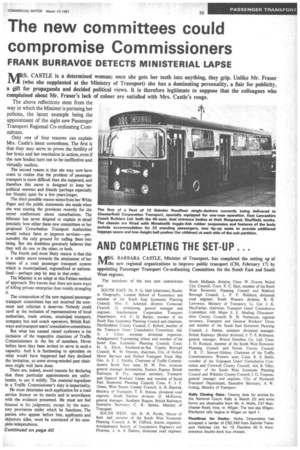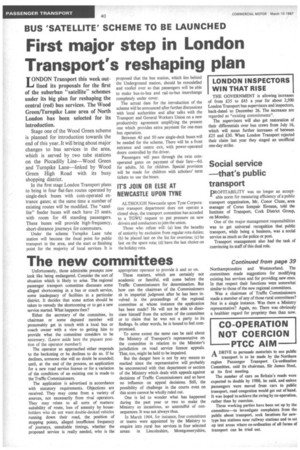The new committees could compromise Commissioners
Page 41

Page 42

If you've noticed an error in this article please click here to report it so we can fix it.
FRANK BURRAVOE DETECTS MINISTERIAL LAPSE
into any
S. CASTLE is a determined woman; once she gets her teeth thing, they grip. Unlike Mr. Fraser MR(who she supplanted at the Ministry of Transport) she has a dominating personality, a flair for publicity, a gift for propaganda and decided political views. It is therefore legitimate to suppose that the colleagues who complained about Mr. Fraser's lack of colour are satisfied with Mrs. Castle's rouge.
The above reflections stem from the way in which the Minister is pursuing her policies, the latest example being the appointment of the eight new Passenger Transport Regional Co-ordinating Corn mittees.
Only one of four reasons can explain Mrs. Castle's latest committees. The first is that they may serve to prove the fertility of her brain and her resolution in action, even if the new bodies turn out to be ineffective and virtually useless.
The second reason is that she may now have come to realize that the problem of passenger transport is more difficult than she supposed, and therefore this move is designed to keep her political enemies and friends (perhaps especially her friends) quiet for a few years longer.
The third possible reason stems from her White Paper and the public statements she made when she was touring the provinces recently for the secret conferences about conurbations. The Minister has never deigned to explain in detail 'precisely how either these new committees or her proposed Conurbation Transport Authorities would reduce fares or improve services—presumably the only ground for calling them into being. But she doubtless genuinely believes that they will do one or the other, or both.
The fourth and most likely reason is that this is a subtle move towards the attainment of her vision of a road passenger transport system which is municipalized, regionalized or nationalized—perhaps step by step in that order.
The Minister is an adept at this Fabian method of approach. She knows that there are more ways of killing private enterprise than noisily strangling it.
The composition of the new regional passenger transport committees has not received the comment and criticism it deserves. Nobody could cavil at the inclusion of representatives of local authorities, trade unions, municipal transport, company bus and coach operators, British Railways and transport users' consultative committees.
But what has caused raised eyebrows is the inclusion of the respective chairmen of Traffic Commissioners in the list of members. Never before have they been invited to serve in such a capacity. And it is fascinating to speculate on what would have happened had they declined the invitation, as some strong-minded past chairmen might well have done.
There are, indeed, sound reasons for declaring that these particular appointments are unfortunate, to put it mildly. The essential ingredient in a Traffic Commissioner's duty is impartiality.
He must determine each application for a road service licence on its merits and in accordance with the evidence presented. He must not feel fettered in his judgments, except by the statutory provisions under which he functions. The parties who appear before him, applicants and objectors alike, must be convinced of his complete independence.
Continued on page 40 Northamptonshire and Westmorland. The committees made suggestions for modifying existing bus services and for providing new ones. In that respect their functions were somewhat similar to those of the new regional committees.
Was a chairman of Traffic Commissioners made a member of any of those rural committees? Not in a single instance. Was there a Ministry representative? Again, no. There was obviously a healthier regard for propriety then than now.




































































































































